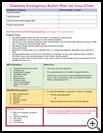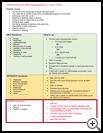
Diabetes: Sick Days
________________________________________________________________________
KEY POINTS
- Diabetes can weaken the immune system, so people with diabetes may sometimes get sick. Diabetes is harder to control when your child is sick.
- Your child’s healthcare provider will work with you to develop a sick-day plan designed especially for your child. The plan should include how often to check your child’s blood glucose (sugar) levels when sick, what to do if your child has symptoms, what foods and liquids are safe to eat and drink, and when to contact your child’s provider.
________________________________________________________________________
How does illness affect diabetes?
Children with diabetes may sometimes get sick. This is because diabetes weakens the immune system, which is the body’s defense against infection.
Diabetes is harder to control when your child is sick. The body releases hormones to help fight the illness. These hormones affect the way your child’s body uses insulin, which can cause a rise in blood glucose (sugar). This means blood glucose can get very high during an illness. If high blood glucose is not treated, it can make your child very sick and become a life-threatening medical emergency.
How do I prepare for illness?
It is good to be prepared for illness with a sick-day plan. Your healthcare provider will work with you to develop a plan designed especially for your child. The plan may include:
- When to contact your provider
- How often to check your child’s blood glucose levels when sick
- How your child should use insulin or other diabetes medicines
- What to do if your child has a fever
- What to do if your child feels sick to the stomach or is throwing up
- What foods and liquids are safe to eat and drink
Your child may also need to check for ketones in the urine. If the body does not make enough insulin, glucose cannot move out of your child’s blood and into the cells. Your child’s blood glucose can get very high, which causes the body to burn fat instead of glucose for energy. This makes byproducts called ketones. When ketones build up to dangerous levels, it is called ketoacidosis. This can cause coma or death if not treated right away. Ketoacidosis may happen with either type of diabetes but is more common with type 1 diabetes.
How can I take care of my child when sick?
- Follow your child’s sick-day plan.
- Have your child’s sick day plan written down where family and caregivers can find it, so everyone knows what to do.
- Unless your healthcare provider tells you not to, make sure your child keeps taking all usual medicines when sick. If your child is unable to take the diabetes medicine, call your child’s provider.
- If your child’s stomach is upset, it’s best to have your child try to eat soft, plain foods and drink plenty of sugar-free liquids. If your child doesn't drink enough, your child may get dehydrated. Ask your healthcare provider about the best food and drink choices when your child is sick and write them on your child’s sick-day plan. Keep your provider informed about how your child is doing, whether your child is getting worse or better, and what your child’s blood glucose readings.
How can I keep my child from getting sick?
You can help prevent some infections if you:
- Stay up to date with the recommended immunizations (shots) for your child including flu and COVID-19. Ask your healthcare provider about any other vaccines your child or your family may need. If your child travels outside the US, check to see what immunizations your child will need.
- Teach your child to wash his or her hands often with soap and water. Your child should wash for at least 20 seconds, which is long enough to sing the whole “Happy Birthday” song twice, or your child can use an alcohol-based hand cleaner if water is not available.
- Teach your child to stay at least 6 feet away from people who are sick and avoid crowded places if you can. Avoid touching the eyes, nose, or mouth when out in public.
- Take care of your child’s health. Make sure your child gets at least 7 to 9 hours of sleep each night. Help your child learn ways to manage stress. Make sure your child stays physically active as advised by your child’s provider. Help your child limit sitting time. Encourage your child to stand or walk around every 30 minutes, or as much as possible. Talk to your child about the risks of smoking, using e-cigarettes, drinking alcohol, and using drugs.
- Keep surfaces clean, especially bedside tables, surfaces in the bathroom, and toys for children. Some viruses and bacteria can live up to 48 hours or more on surfaces such as cafeteria tables, door handles, and desks. Wipe them down with a household disinfectant according to directions on the label.
- Check your child’s skin weekly for signs of rash, injury, and infection.
- Have your child see the dentist regularly for cleaning and checkups.
For more information, contact:
- American Diabetes Association
800-342-2383
https://www.diabetes.org/
Last modified: 2021-09-07
Last reviewed: 2022-02-05


